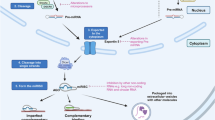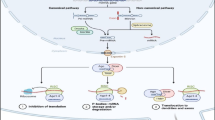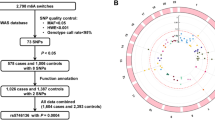Abstract
Recent evidence indicates the involvement of microRNAs (miRNAs), in cell growth control, differentiation, and apoptosis, thus playing a role in tumorigenesis. Single-nucleotide polymorphisms (SNPs) located at miRNA-binding sites (miRNA-binding SNPs) are likely to affect the expression of the miRNA target and may contribute to the susceptibility of humans to common diseases. We genotyped SNPs hsa-mir196a2 (rs11614913), hsa-mir146a (rs2910164), and hsa-mir499 (rs3746444) in a case–control study including 159 prostate cancer patients and 230 matched controls. Patients with heterozygous genotype in hsa-mir196a2 and hsa-mir499, showed significant risk for developing prostate cancer (P = 0.01; OR = 1.70 and P ≤ 0.001; OR = 2.27, respectively). Similarly, the variant allele carrier was also associated with prostate cancer, (P = 0.01; OR = 1.66 and P ≤ 0.001; OR = 1.97, respectively) whereas, hsa-mir146a revealed no association in prostate cancer. None of the miRNA polymorphisms were associated with Gleason grade and bone metastasis. This is the first study on Indian population substantially presenting that individual as well as combined genotypes of miRNA-related variants may be used to predict the risk of prostate cancer and may be useful for identifying patients at high risk.


Similar content being viewed by others
References
Hsing AW, Devesa SS (2001) Trends and patterns of prostate cancer: what do they suggest? Epidemiol Rev 23:3–13
Parkin DM, Whelan SJ, Ferlay J, Teppo L, Thomas DB (2003) Cancer incidence in five continents, vol VIII. IARC Press Publication 155, p 782
Sinha R, Anderson DE, McDonald SS, Greenwald P (2003) Cancer risk and diet in India. J Postgrad Med 49:222–228
Porkka KP, Pfeiffer MJ, Waltering KK, Vessella RL, Tammela TLJ, Visakorpi T (2007) MicroRNA expression profiling in prostate cancer. Cancer Res 67(13):1630–1635
Bartel DP (2004) MicroRNAs: genomic, biogenesis, mechanism, and function. Cell 116:281–297
Zhang B, Pan X, Cobb GP, Anderson TA (2007) microRNAs as oncogenes and tumor suppressors. Dev Biol 302:1–12
Calin GA, Sevignani C, Dan Dumitru C, Hyslop T, Noch E, Yendamuri S et al (2004) Human microRNA genes are frequently located at fragile sites and genomic regions involved in cancers. Proc Natl Acad Sci USA 101:2999–3004
Calin GA, Croce GM (2007) Investigation of microRNA alterations in leukemias and lymphomas. Methods Enzymol 427:191–213
Iwai N, Naraba H (2005) Polymorphisms in human pre-miRNAs. Biochem Biophys Res Commun 331:1439–1444
Yu Z, Li Z, Normand Jolicoeur N, Zhang L, Fortin Y, Wang E et al (2007) Aberrant allele frequencies of the SNPs located in microRNA target sites are potentially associated with human cancers. Nucleic Acids Res 35:4535–4541
Hu Z, Chen J, Tian T, Zhou X, Gu H, Xu L et al (2008) Genetic variants of miRNA sequences and non-small cell lung cancer survival. J Clin Invest 118:2600–2608
Hu Z, Liang J, Wang Z, Tian T, Zhou X, Chen J et al (2009) Common genetic variants in pre-microRNAs were associated with increased risk of breast cancer in Chinese women. Hum Mutat 30:79–84
Xu T, Zhu Y, Wei QK, Yuan Y, Zhou F, Ge YY et al (2008) A functional polymorphism in the miR-146a gene is associated with the risk for hepatocellular carcinoma. Carcinogenesis 29:2126–2131
Yang H, Dinney CP, Ye Y, Zhu Y, Grossman HB, Wu X (2008) Evaluation of genetic variants in microRNA-related genes and risk of bladder cancer. Cancer Res 68:2530–2537
Jazdzewski K, Murray EL, Franssila K, Jarzab B, Schoenberg DR, de la Chapelle A (2008) Common SNP in pre-miR-146a decreases mature miR expression and predisposes to papillary thyroid carcinoma. Proc Natl Acad Sci USA 105:7269–7274
Landi D, Gemignani F, Barale R, Landi S (2008) A catalog of polymorphisms falling in Micro-RNA binding regions of cancer genes. DNA Cell Biol 27(1):35–43
Croce CM (2008) Oncogenes and cancer. N Engl J Med 358:502–511
Zhang W, Dahlberg JE, Tam W (2007) MicroRNAs in tumorigenesis: a primer. Am J Pathol 171:728–738
Gleason DF, Mellinger GT (1974) Prediction of prognosis for prostatic adenocarcinoma by combined histological grading and clinical staging. J Urol 111:58–64
Miller SA, Dykes DD, Polesky HF (1988) A simple salting out procedure for extracting DNA from human nucleated cells. Nucleic Acids Res 16:1215
Calin GA, Dumitru CD, Shimizu M, Bichi R, Zupo S, Noch E et al (2002) Frequent deletions and down-regulation of micro-RNA genes miR15 and miR16 at 13q14 in chronic lymphocytic leukemia. Proc Natl Acad Sci USA 99:15524–15529
Iorio MV, Ferracin M, Liu CG, Veronese A, Spizzo R, Sabbioni S et al (2005) MicroRNA gene expression deregulation in human breast cancer. Cancer Res 65:7065–7070
Hayashita Y, Osada H, Tatematsu Y, Yamada H, Yanagisawa K, Tomida S et al (2005) A polycistronic microRNA cluster, miR-17–92, is overexpressed in human lung cancers and enhances cell proliferation. Cancer Res 65:9628–9632
Guo Y, Chen Z, Zhang L, Zhou F, Shi S, Feng X et al (2008) Distinctive microRNA profiles relating to patient survival in esophageal squamous cell carcinoma. Cancer Res 68:26–33
Bloomston M, Frankel WL, Petrocca F, Volinia S, Alder H, Hagan JP et al (2007) MicroRNA expression patterns to differentiate pancreatic adenocarcinoma from normal pancreas and chronic pancreatitis. JAMA 297:1901–1908
Ambs S, Prueitt RL, Yi M, Hudson RS, Howe TM, Petrocca F et al (2008) Genomic profiling of microRNA and messenger RNA reveals deregulated microRNA expression in prostate cancer. Cancer Res 68:6162–6170
Ozen M, Creighton CJ, Ozdemir M, Ittmann M (2008) Widespread deregulation of microRNA expression in human prostate cancer. Oncogene 27:1788–1793
Lin S-L, Chiang A, Chang D, Ying S-Y (2008) Loss of mir-146a function in hormone-refractory prostate cancer. RNA 14:417–424
Tian T, Shu Y, Chen J, Hu Z, Xu L, Jin G et al (2009) A functional genetic variant in microRNA-196a2 is associated with increased susceptibility of lung cancer in Chinese. Cancer Epidemiol Biomarkers Prev 18:1183–1187
Khoury MJ, Flanders WD (1996) Nontraditional epidemiologic approaches in the analysis of gene-environment interaction: case-control studies with no controls. Am J Epidemiol 144:207–213
Shi X-B, Clifford G, Tepper B, de Vere White RW (2008) microRNAs and prostate cancer. J Cell Mol Med 12(5):1456–1465
Acknowledgments
This study was supported by Uttar Pradesh Council of Science and Technology (UPCST) grant, Lucknow, India. RG and RKM are thankful to Council of Scientific and Industrial Research for Senior and junior research fellowship. We are also thankful to Dr. Anil Mandhani for his expert opinion in the study.
Conflict of interest
There is no conflict of interest.
Author information
Authors and Affiliations
Corresponding author
Rights and permissions
About this article
Cite this article
George, G.P., Gangwar, R., Mandal, R.K. et al. Genetic variation in microRNA genes and prostate cancer risk in North Indian population. Mol Biol Rep 38, 1609–1615 (2011). https://doi.org/10.1007/s11033-010-0270-4
Received:
Accepted:
Published:
Issue Date:
DOI: https://doi.org/10.1007/s11033-010-0270-4




